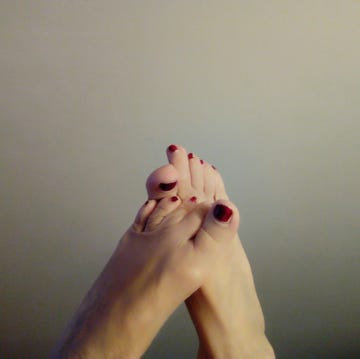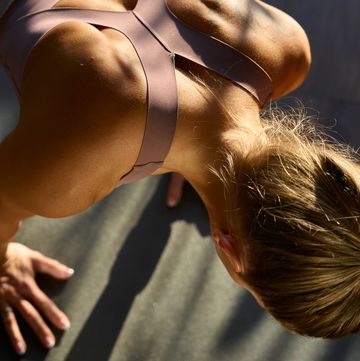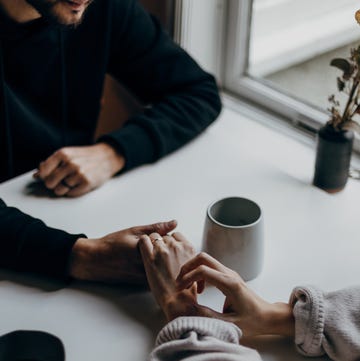With over 8 million people struggling with an anxiety disorder in the UK alone, it's safe to say that anxiety is much more common than those experiencing it might assume. It’s a feeling that all of us will likely experience at some point in our lives and, according to Fatmata Kamara, Specialist Nurse Adviser for Bupa UK, it’s “completely normal to feel mild anxiety, especially if you’re experiencing something stressful, like a job interview, a break-up or a house move". In fact, stress can actually help you perform better in stressful situations, as it can help you stay alert, she explains.
However, if anxiety is severe or lasts for a long time it can cause physical as well as mental health problems. Those often debilitating feelings can become more than just thoughts in the mind, with the NHS listing 13 physical symptoms of anxiety including headaches, breathlessness, muscle aches and insomnia.
Here we delve into those physical symptoms of anxiety, offering expert-approved self-care treatments and advice on how to seek professional help.
How anxiety affects your body
Fatmata describes anxiety as "a feeling of general unease or worry that can occur for several reasons, for example, if you’re fearing anything relating to the future, failure, embarrassment, illness or loss".
But what causes those physical symptoms of anxiety that often plague us, impacting our daily lives even more? “When we’re anxious, our body triggers a similar response to when we’re stressed, producing the hormone adrenaline to help us cope with the situation,” Fatmata explains. “This activates the ‘fight or flight’ response, which has helped our ancestors to protect themselves from danger – either by facing a threat or by running from it.”
We may all be adapting to modern life, but adrenaline still tries to help us when we’re feeling anxious, even if we’re not in immediate physical danger. “It can make us feel uncomfortable," says Fatmata, "as when it’s released into our bloodstream it can change the way our body functions.”
Everyone feels certain levels of anxiety at different points of their lives, and it's important to look at how it has helped you survive while also acknowledging when it has made things more difficult.
Zoë Aston, Headspace’s Mental Health Expert, suggests that anxiety becomes an issue when it stops you from carrying out your daily life. "If this goes on for more than six weeks, seek guidance from your GP or speak to a mental health professional like a therapist or a counsellor," she says.
Physical symptoms of anxiety
The NHS lists the 13 physical symptoms of anxiety below, but Zoë adds that by the time anxiety is physical "‘it is most likely chronic, and it is always advisable to seek further help". If in doubt, always give your GP a ring.
- Breathlessness
- Shaking or trembling
- Feeling sick
- Stomach ache
- Insomnia
- Sweating
- Muscle aches or tension
- Headaches
- Numbness or tingling
- Dizziness
- Tiredness
- Palpitations or chest pain
- Dry mouth
Breathlessness
This can be caused by your 'flight, fight, freeze' system being activated, explains Zoë. "It's there to inform you that there is a threat present, and the breathlessness, in part, is your body getting into a sympathetic state where it can react and ensure survival."
To help with breathlessness, try breathwork or other mindfulness techniques. Zoë recommends the Headspace app for guidance.
Shaking or trembling
Shaking and trembling occurs when your body is trying to release the adrenaline and cortisol hormones that have built up, Zoë explains.
She suggests: "Rather than trying to stop the shakes or the trembles, find somewhere private where you can shake it all out and allow those hormones to release in the way they are meant to be."
Fatmata adds that responsible exercise can be beneficial to help release some of your pent-up stress.
Feeling sick
Perhaps you’ve been feeling nauseous or have noticed that your appetite just isn’t what it used to be – this is because anxiety tells us we are under threat.
"When our mind perceives danger it interprets the situation as one where we may need to fight, flight or freeze in order to survive," explains Zoë. "To preserve energy all non-essential systems are halted, including your digestion."
If you find that you’re so anxious that you can’t eat, try consuming liquid calories instead to keep your energy up and speak with a professional for support.
Stomach ache
“When anxiety gets into your striated muscles – the muscles you do not have conscious control over – you might start to experience symptoms like irritable bowel syndrome, a change in your menstrual cycles and heart palpitations, to name a few,” says Zoë.
Diarrhoea – a common IBS symptom – can become a problem during anxious times, which Fatmata explains is because your heart is prioritising pumping blood to the muscles that allow us to run away or attack. Because of this, the muscles around your inner sphincter relax, meaning you may feel an urgent urge to use the toilet.
“If you’re feeling particularly anxious, try to avoid any food or drink that may cause you to use the toilet more often, like caffeine, alcohol or anything high-fibre,” says Zoë.
She recommends getting any physical issues checked out by a health professional and looking into specific emotional support like talking therapy or holistic body therapies.
It's also important to note that while IBS can be a symptom of anxiety, it may also cause anxiety in some women; gut health supplement brand Symprove surveyed 2,000 women in the UK and found that 77% who were suffering with IBS said it impacted their mental health.
Dr Sara Kayat, GP and Symprove expert, explains: "The gut and the brain have a very intimate relationship and are in constant communication with one another. This is called the 'gut-brain axis'. It's a two-way street: an unhappy gut will send signals to the brain letting it know, and an unhappy brain will send signals to the gut letting it know."
Insomnia
When you’re anxious or stressed, your body is on high alert, which stops you from relaxing and being able to fall asleep.
Try to wind down before bed, avoiding screens and technology and opting for a calm activity such as reading or deep breathing. Zoë recommends practising any self-soothing activities like mindfulness away from your bed, and then getting under the covers as you start to drift off.
Sweating
Sweating occurs as your body tries to cool down when it’s fleeing from danger. However, when you’re anxious, the same concoction of hormones is released, creating the same effect.
If you know you’re going to have an anxious day, Fatmata suggests wearing loose-fitting cotton clothes and avoiding eating or drinking anything that could make you sweat more, such as alcohol or spicy food.
Muscle aches or tension
When we’re frightened, anxious or stressed, our body experiences increased tension. This, along with an increase in blood flow, can cause a feeling of heavy legs, as well as general aches and pains.
Gentle exercise or stretching can help to give your blood flow and muscles a chance to do what they need to do – get you moving! Fatmata also recommends gently massaging your muscles to release tension, followed by a hot shower, stretching or yoga.
Headaches
Headaches when you’re anxious are due to the hormonal response in your mind’s 'fight or flight' system, says Zoë. Fatmata adds that blood pumping around your body to fuel your muscles can also cause aches and pains.
"Next time you sense your headache is related to an anxious reaction, try talking to someone about what's bothering you and notice if the headache reduces or even goes away entirely," she suggests.
Numbness or tingling
Feelings of numbness can occur because your heart is prioritising the areas of your body to pump blood to, explains Fatmata. This 'fight or flight' response causes blood vessels to get smaller, which can cause an increase in heart rate and less blood being pumped to your hands and feet, which are two areas furthest away from the heart – hence that uncomfortable 'pins and needles' feeling.
Dizziness
When we’re anxious or nervous, we tend to hold our breath or breathe much faster and shallower. This helps to move oxygen towards our major muscle groups to get them ready for action. "However, this can make you feel both dizzy and lightheaded," says Zoë.
Breathwork can help, as can a body scan meditation focusing on each limb as you breathe deeply and encourage your mind and body to relax.
Tiredness
The harder your body is having to work to prepare for fighting off a perceived risk, the more tired you are likely to feel, especially if you are also struggling with insomnia. Take it easy and rest where possible, and see your doctor if your tiredness or fatigue becomes unmanageable.
Palpitations or chest pain
Zoë explains that anxiety-related chest pains are often due to the hormonal response caused by the 'fight or flight' response. Chest pains can feel sharp or shooting, a dull ache or even like spasms. The stress response can present itself as tension, which may take place in the chest.
Deep breathing and relaxation apps can help the pain. However, if your chest pain is regular, visit your GP to rule out any other conditions. If you’re ever worried about chest pains, seek immediate medical attention. See the NHS website for guidance.
Fatmata adds that the increase in heart rate caused by anxiety can lead to palpitations. “As adrenaline is sending more blood to your muscles, helping you to take in more oxygen, your heart has to work harder, making it beat faster,” she explains.
Dry mouth
Experiencing a dry mouth is a common physical symptom of anxiety. Fatmata explains that the dry sensation is due to your body prioritising sending fluids to your major muscles instead, as they may need the power to run.
To help hydrate your mouth, she recommends drinking water and eating or chewing something that helps to generate more saliva, such as chewing gum, carrots, celery or sugar-free lollies.
What is the 333 rule for anxiety?
The 333 rule is a common self-help treatment for anxiety. To give it a go when you're next feeling anxious: name three things you can see, three things you can touch and three things you can hear. This helps engage your senses and ground you in the present moment.
Try the 555 rule too: inhale deeply for five seconds, hold your breath for five seconds, and then exhale for five seconds.
How to get help for anxiety
If you or someone you know is struggling with anxiety, it’s important to seek out help from someone you trust. Speak with your GP who will be able to refer you to talking therapies or counselling and offer professional support and guidance.
You could also try a listening service such as Samaritans; the helpline is open 24/7 on 116 123 to provide support and advice. Or, contact text-based support service Shout by texting SHOUT to 85258.
For specialist anxiety advice, Anxiety UK also offer support services on the phone from Monday to Friday, 9.30am to 5.30pm. Try 03444 775 774. They also offer a text support service on 07537 416905.
For more information on anxiety, see the NHS website.













